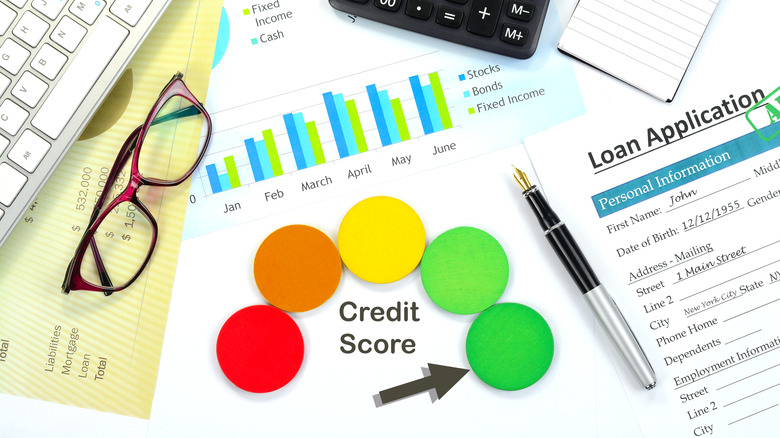Here's The Average Credit Score For People By Age
Credit scores are like financial report cards that change over time based on how you handle your money and what's happening in the economy. These three-digit numbers come from your credit reports and give lenders a peek into how good you are at managing debt. A solid score can unlock some sweet deals like low-interest rates and fancy financial products. So, think of your credit score as a key — it can either open up a bunch of doors or leave you fumbling at the lock when you need access the most.
Five main factors influence your credit score: payment history, amounts owed, length of credit history, types of credit used, and new credit inquiries. Of these, your payment history is the most crucial. Financial habits passed down generations can also shape how your credit score looks alongside the economy during a person's key earning years. Things like changing interest rates, the job market, and what kind of credit cards or loans are available can all influence how people manage their debt and build up their credit.
It's important to examine how different generations handle their finances, not to compare, but to learn about the long-term effects of financial choices and economic conditions. You will find why it is important to adjust financial strategies to fit your stage in life, while also paying attention to past trends to make smarter decisions about credit.
Generation Z (Born 1997-2012)
For those born between 1997 and 2012, also known as Gen Z, credit scores are just beginning to take shape. The average credit score for this generation dropped to 659 in Q2 2024 landing them in the "good" category, though still behind older groups. This reflects the reality that some Gen Zers haven't had much time to build their credit since many are only now starting to carve out their financial identities.
Still, Generation Z is splurging big time and it shows up in their credit cards . As of 2024, via Experian, the average credit card balance for Gen Z is around $3,262, which marks a 14.3% increase from the previous year. And it's not just about swiping cards; Gen Z is all in on digital — think digital wallets and trendy buy-now-pay-later apps. Meanwhile, credit card companies are like bees to honey, zooming in on these eager spenders, ready to hand out new cards.
Besides, the burden of average student loan debt, placed at $22,948 by EducationData.org, impacts credit scores for Gen Z. While managing loans properly can boost a credit score, missing payments or paying late can drag it down. Also, not having a different mix of credit, like mortgages or installment loans, can limit how much their scores grow. It's a lot to handle, especially when money matters are as unpredictable as they are now. If you are Gen Z, learn the best ways to strengthen your credit score through your 20s.
Millennials (Born 1981-1996)
Millennials are in an interesting spot with an average credit score of 690. They've had more time than Gen Z to build their credit histories, which really helps boost their scores. Yet, a big hurdle for Millennials is the mountain of student loan debt they often carry. This generation really got hit with the student loan trend, taking on hefty debts to pay for school. Per Experian data published in March 2024, Millennials aged 28 to 43 have an average student loan debt of $40,438.
Owning a home is a big goal for this group, but it's not always easy to get there. With property prices going up and wages not keeping pace, many have had to put off buying a home. For those who do take the plunge and get a mortgage, it actually helps their credit scores by mixing up the types of credit they use, which can make their credit profiles look stronger. However, the financial squeeze of owning a home — like saving for down payments and covering all those ongoing home expenses — can sometimes push them to rely on their credit cards.
The economic rollercoaster, including the aftermath of the Great Recession, has really shaped how Millennials handle their credit. Many also leaned heavily on credit cards during this tough time, which sometimes bumped up their debt levels a bit too high. Armed with this hard-earned wisdom, they now make smarter credit moves — like focusing on paying down debts and keeping their card balances low.
Generation X (Born 1965-1980)
With an average credit score of 705, Gen X shows off their solid experience in managing credit. Many in this group are hitting their peak earning years. They boast longer credit histories, a variety of credit types, and a more established financial presence compared to younger generations. Gen X often uses credit actively, guided by life events like buying homes, raising kids, and planning for retirement. Mortgages also make up their credit profiles, as owning a home is still a major goal for many. Handling a mortgage and other types of installment loans well — making sure payments are timely and consistent — can really help boost their credit scores.
Credit cards are a big deal for Gen X. They usually have higher balances compared to younger folks, often using their cards for big-ticket items or to handle emergencies. This active use of credit is good because it shows they're using their accounts, but it can bump up their credit utilization ratio — a fancy term for how much of their credit limit they use — and slightly lower their credit scores. Having experienced multiple economic shifts, including the dot-com bubble and the 2008 financial crisis, Gen X is all about playing the long game with their finances. Many focus on stashing away cash for emergencies, chopping down debt, and packing their retirement funds. Plus, having been in the credit game for a while works to their advantage.
Baby Boomers (Born 1946-1964)
Baby Boomers are heading into retirement with an impressive average credit score of 745. This score is proof of their well-established credit histories. Aside from the problems coming to the workforce as more Boomers retire, retirement brings its own set of challenges to this group as it is a big life change that can shake up their credit score more than they might expect. Switching from a paycheck to a fixed income means they might lean more on credit to cover unplanned costs like medical bills or home repairs. While some Boomers manage to shrink their debt before retiring, others still have mortgages, credit card debt, or personal loans hanging over them.
In 2023, LendingTree crunched the numbers on more than 150,000 anonymized credit reports from early that year, comparing them to 87,000 reports from March 2021. What they found was pretty interesting: from 2021 to 2023, Baby Boomers (those aged 59 to 77) managed to cut down their non-mortgage debt by a hefty 26.4%. However, the story's a bit different when it comes to their homes. Both Boomers and Gen Xers are still shouldering a lot of mortgage debt. In fact, the average mortgage debt for Boomers was about $90,709 at the start of 2023. It seems like while they're getting better at handling some debts, the big ones tied to their homes still lie around, pulling down their credit score.
Silent Generation (Born 1928-1945)
This generation has a decade-long history of consistency, in terms of credit use, and timely payments. They also have low delinquency rates, which must be the reason they have an average credit score of 760 — the highest credit score amongst all age groups. The Silent Generation maintains long-standing accounts and positive long term credit history, which is a key component of credit scoring models among all age groups.
Many in this group have also paid off major debts, such as mortgages and auto loans, further solidifying their financial standing. This reduced reliance on borrowing aligns with a certain focus on preserving financial assets and maintaining independence. Also, with fewer active financial obligations, you are less likely to face high credit utilization.
For those living on fixed incomes, like many in the Silent Generation, cutting back on credit use is a common strategy as financial goals shift towards stability and keeping debt to a minimum. This cautious approach helps dodge financial stress but can sometimes lead to inactive credit files. To avoid this, those in this generation should keep at least one credit account active and avoid outdated money rules.





